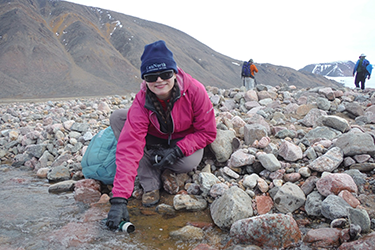
An Undergraduate Experience in Arctic Research
Nicole Marleau spent two months researching in Alexandra Fiord - a place further north than any permanent community in the world.
Protecting yourself from polar bears might not be part of a typical soil science lesson plan, but when you’re conducting research near the tip of the Canadian Arctic, it’s a necessary skill.
“I will never forget the morning when I woke up to the sound of a gunshot and a scream of ‘bear!’” says Nicole Marleau, an undergraduate student in the College of Agriculture and Bioresources.
“When I opened my tent zipper, I saw a polar bear running away from our camp. The bear had managed to rip down part of my colleague’s tent, about two tents away from me. Thankfully, no one was injured, but that memory will remain with me – and most definitely with my colleague – forever.”
Marleau spent the July and August before her fourth year of study in Alexandra Fiord, Nunavut, a place further north than any permanent community in the world. She was working as a research assistant for soil science professor Steven Siciliano and his team of four graduate students.
Marleau was funded in part through the U of S’s Undergraduate Summer Research Assistantship program, which provides funding for undergraduates interested in experiencing research. This summer, the Undergraduate Research Initiative awarded funding to support 76 students.
While how to scout for polar bears was part of her training, Marleau spent most of her time in the north assisting with research projects and doing work around camp.
Research work involved carrying heavy machinery to take gas samples, as well as collecting and cataloging samples of tiny Arctic plants. By the end of the trip, she had assisted on all of the research projects being conducted by Siciliano and his students.
When you’re camping on top of a nearly barren Arctic mountain for weeks at a time, research is just the beginning of the necessary work. Marleau also spent a great deal of time doing everything from cooking and cleaning, to hauling water up the mountain.
“I worked so hard,” she laughs. “In two months I think I had a total of three days off.”
But for Marleau, the hard work was an easy trade-off for an experience as unique as travelling to Alexandra Fiord.
“When I first arrived I was just in awe, it was so peaceful there,” she recalls.
“In the lowlands by the ocean the scenery was so relaxing and so unlike anything I’ve seen before. On top of the mountain, you could see all the other mountains around you, the lowlands, you could even see Greenland. Then crazy weather would blow in and there would be clouds below your feet.”
Started by sharing her research interests

Marleau first started working with Siciliano after sharing her interests with another professor.
“I mentioned to the lead professor in our degree program that I’m interested in environmental remediation. He told me about Dr. Siciliano and recommended that I get in contact,” she says.
Shortly after the connection was made, Marleau was working as an assistant in Siciliano’s lab.
In Siciliano’s experience, undergraduates have been “invaluable” members of his research team.
“Ideas are generated when one is forced to confront one’s assumptions about the world,” he says.
“By involving undergraduates in research, professors and graduate students must confront their assumptions as they explain them to undergraduates. Then often as we discuss the issues, ideas are generated and novel hypotheses generated. Thus, undergraduates are essential to the uncovering of brilliant hypotheses.”
The field work opportunity came as a surprise to Marleau. One day, Siciliano invited her into his office and asked if she would be interested in working in the Arctic for two months.
“I didn’t know much about the trip at all at that point, but I just said ‘yes.’ I knew that he has done some amazing work and that this would be a once-in-a-lifetime opportunity, so I just jumped on it,” Marleau says.
After a few months of preparation, Marleau was onboard a Twin Otter plane, Arctic air blowing at her feet.
Experience spurred interest in graduate studies
 One of the glaciers surrounding the team's camp.
One of the glaciers surrounding the team's camp.
Her experience in the field ended up being very influential.
“I had never considered graduate studies before my research experience,” she says.
“This research project helped me develop a passion and understanding for environmental research, and as a result, has pushed me into pursuing a research project of my own.”
Following the completion of her bachelor’s degree in renewable resource management with a minor in toxicology, Marleau joined the Department of Soil Science to pursue a master’s degree.
“I was always self-conscious about my ability to be a researcher, and being able to do what it takes. But being in that research environment and hearing the discussions that take place made me realize it’s very possible for me,” she says.
“You always have your peers and professor to go to and problem solve. That was comforting and built my confidence in my own abilities.”

